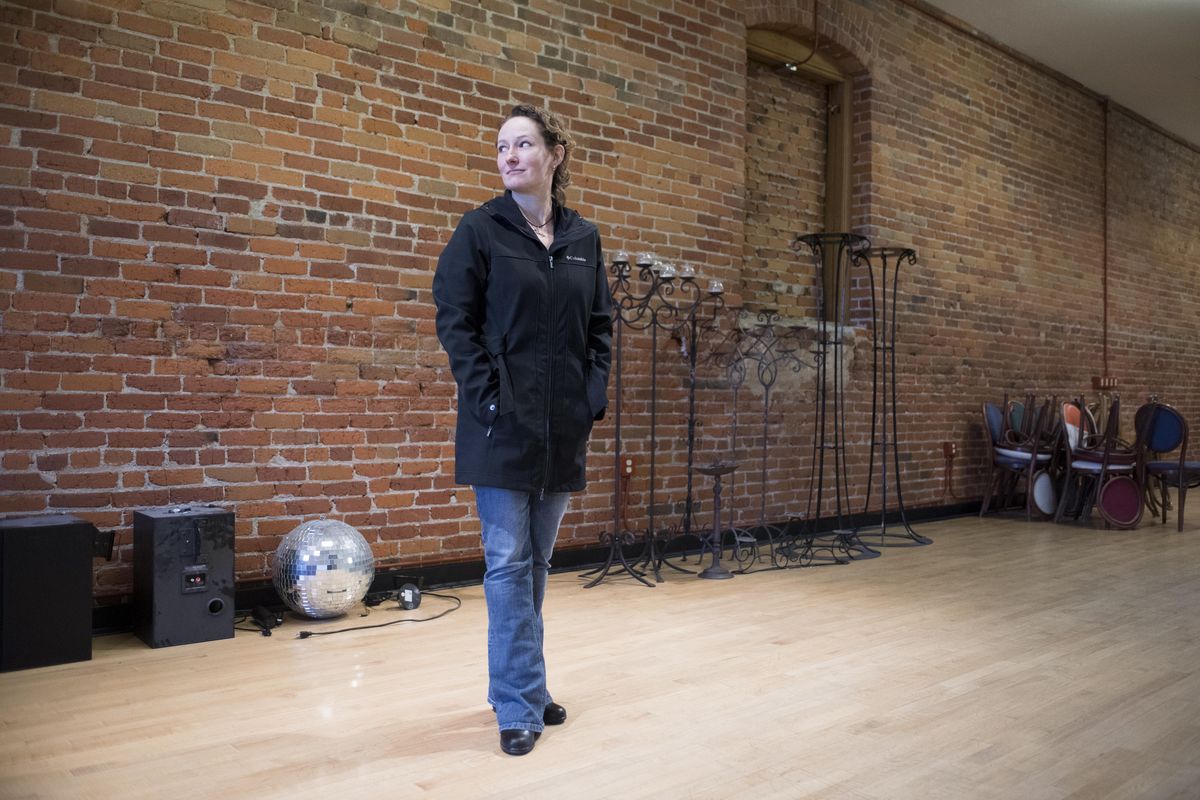Studio owner sues city of Spokane over damage caused by raccoons

Amanda Hansen believes her dance studio and wedding rental business died because of raccoon poop.
“You can still see the yellow,” said Hansen, gesturing last week to a brick wall her shuttered business, Dance Street Ballroom, shares with a decaying city-owned building near the Spokane Veterans Memorial Arena. “That wasn’t there before.”
Open bags of Arm and Hammer baking soda and industrial size jars of coffee are the littered remains of a battle fought against the encroaching smell, which one patron likened to dirty diapers, Hansen said. But after a decade and a half of problems with the wall, the business finally closed in 2015.
Fed up with what she sees as broken promises by the city to provide a permanent fix for the mold and water damage to her property, Hansen filed a half-million-dollar claim against the city in September and a lawsuit three months later.
“It was our last resort,” Hansen said of the lawsuit. “It’s not at all what we wanted to do. But we just felt like we’re not being taken seriously. We felt like we’re being shuffled off and ignored.”
Hansen’s business was at 433 W. Dean Ave., a historic building where horses delivering milk to homes were stabled starting around 1910.
The building shares its wall with a service garage that appears to have been constructed after Carnation bought up the block in the late 1940s and modernized its production in the nearby Broadview Dairy building at the corner of Washington Street and Cataldo Avenue. The city bought the garage as part of an acquisition of property along the north bank of Riverfront Park in 1999. Hansen’s troubles started shortly thereafter, according to a legal complaint filed in Spokane Superior Court in December.
City maintenance crews provided temporary fixes to the problem over the years. Hansen acknowledges these efforts, including a temporary seal put in place on top of the single-story service garage, cutting holes in its roof to stop the pooling of water and cleaning and sealing of the wall by a professional firm. Once it was clear raccoons were causing the most severe issues in December 2014, workers cleared the trees the animals were using to scale the building and construct their latrines, Hansen said.
The permanent fix, to tear down the service garage, has been promised several times, according to the lawsuit and reports from The Spokesman-Review. Demolition was most recently proposed in 2015, according to the lawsuit, but an engineer’s report indicated doing so would damage the ballroom property. Unlike the Broadview Dairy building, Hansen’s location – purchased by her family in 1954 to house a sheet metal company that operated until the 1970s – is not protected by any historical designation.
“We don’t want to sell it,” Hansen said, though the issues with the wall have made advertising the building for sale impossible. “We want our building back.”
Fianna Dickson, a spokeswoman for the city’s Parks Department, said the city would not comment on pending litigation. She said the garage is being used for storage and that a recent solicitation of bids to remove asbestos from the building is not related to the lawsuit.
“The asbestos removal is something we would do regardless of the outcome of the litigation,” Dickson said. “It’s just the right thing to do.”
The Park Board is set to review a contract for asbestos removal in the garage at its regularly scheduled meeting Thursday, Dickson said.
Hansen, who taught ballroom dancing students from Gonzaga University in the studio until the wall’s condition forced her out, said her main concern during the raccoon infestation was health-related. Her breathing became more difficult and she consulted a doctor after reading about
The doctor gave Hansen a clean bill of health, as did the Spokane Regional Health District. But the scare prompted her to leave the building for good, and her business is on hiatus while city officials determine the garage’s future.
Hansen and her father, who serves as landlord of the property, have explored turning the space into luxury apartments as a way to get in on the downtown housing boom. But for now, remnants of her previous business – a piano, a decorative iron gate to usher newly wedded couples into their reception, a discarded disco ball sitting next to unplugged audio speakers – litter the dance floor Hansen installed 20 years ago.
“I don’t see a way for our building to come back to life, without their building going away,” Hansen said.
An initial court date has been scheduled for March before Spokane Superior Court Judge John O. Cooney. The original claim requests damages of $492,000, most of which is categorized as lost rental income.